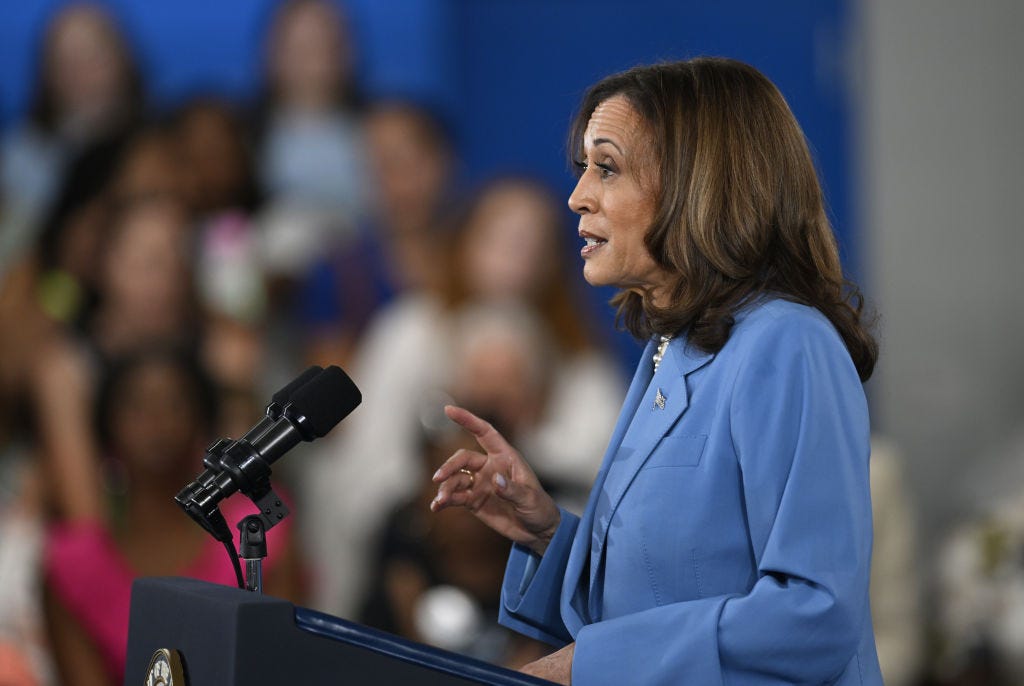
As Vice President Kamala Harris prepares for the biggest night of her political career this Thursday, it’s critical to remember that no one who will be wildly cheering and hanging on her every word in Chicago matters a bit in terms of victory or defeat come November.
Everyone in attendance at the DNC adores the party’s newly minted nominee and will do whatever it takes to propel her to victory. But the adulation of the partisan crowd and the support of big donors backing the campaign should not be confused for the informed support of the American electorate.
Going in to the convention, more than one-third of American voters say they do not know what Kamala Harris stands for compared to less than 15 percent who feel the same way about Donald Trump, according to recent CBS News/YouGov polling.
Thursday night’s acceptance speech is Harris’s final chance to introduce herself to a large chunk of voters who know little to nothing about the current vice president and her nascent campaign. The task with her speech is to fill in the knowledge gap for these potential voters by answering two basic questions that occupy their minds:
What exactly will Kamala Harris do for me and the country?
What type of person is Kamala Harris, and will I like and trust her?
The first question is a matter of Harris’s agenda as president and what precisely she would do for normal middle-class Americans. Will her tax proposals hurt them or help them? Will her spending plans help their families or set them back? Will her plans cost a lot, and if so, what are the tradeoffs and how will they be paid for? Does Harris have a plan for the national economy and overall growth that benefits all workers and regions with plenty of good jobs and new business opportunities?
Harris doesn’t need to lay out a manifesto, but she does need to turn her recent addresses in North Carolina and on the trail into a few memorable—and repeatable—policy propositions that voters associate with her campaign.
More importantly, undecided and lightly engaged voters will certainly scrutinize her speech and reactions to it to help flesh out what they think about her on a personal level. For example, does she seem like a decent person with the right values? Do people believe what she says and trust her to keep her promises? Do they view Harris as the type of leader who will command authority and project strength on the world stage, with both allies and adversaries? Will voters like her (or at least tolerate her) being in their lives non-stop for the next four years, or will they find her annoying?
These may seem like silly or unimportant concerns. But they are a vital part of how voters actually think.
Partisan elites and activists who follow politics habitually often underestimate this intangible side of voter decision making. When it comes down to it, many Americans think about the president first and foremost as a person. They want to have a good sense of who they are and how they think and how they might relate to them. Voters also want some reassurance that presidents really do care about the challenges they face everyday and understand the stresses of normal people and their families.
Going in to Thursday night, the country is seemingly split on whether Harris or Trump has the better agenda and personality to serve as president. The race is basically a toss up. Harris has been riding a partisan high for weeks now as jubilant Democrats express their thanks for Biden stepping down and their optimism for Harris taking charge.
But party elites and diehards are baked in. Trump failed to recognize this reality with his own acceptance speech at the RNC that veered off into numerous divergences that left many people scratching their head. It was a missed opportunity for him and his campaign after a pretty good run with rising public support and sympathy following the attempt on his life.
Now Harris runs a similar risk of misinterpreting the smiles and cheers from party loyalists in Chicago as the appreciation and support of a true voting majority. She’s not there yet and shouldn’t miss the chance to let people know her agenda, and see her personality up close, with a concise and honest address aimed squarely at the one third of voters who haven’t made up their minds about her.





“Harris doesn’t need to lay out a manifesto, but she does need to turn her recent addresses in North Carolina and on the trail into a few memorable—and repeatable—policy propositions that voters associate with her campaign.”
No, sadly, she doesn’t need to do any such thing and she won’t. The lapdog media intend to carry her over the finish line and part of that will be to never, never ask her a hard question. Then, after November, if she wins, we’ll find out she’s still the same Kamala she was before the nomination. Surprise!
I'll save everyone time reading coverage of the Harris speech. "Brilliant" "Inspiring" "The New Eleanor Roosevelt"